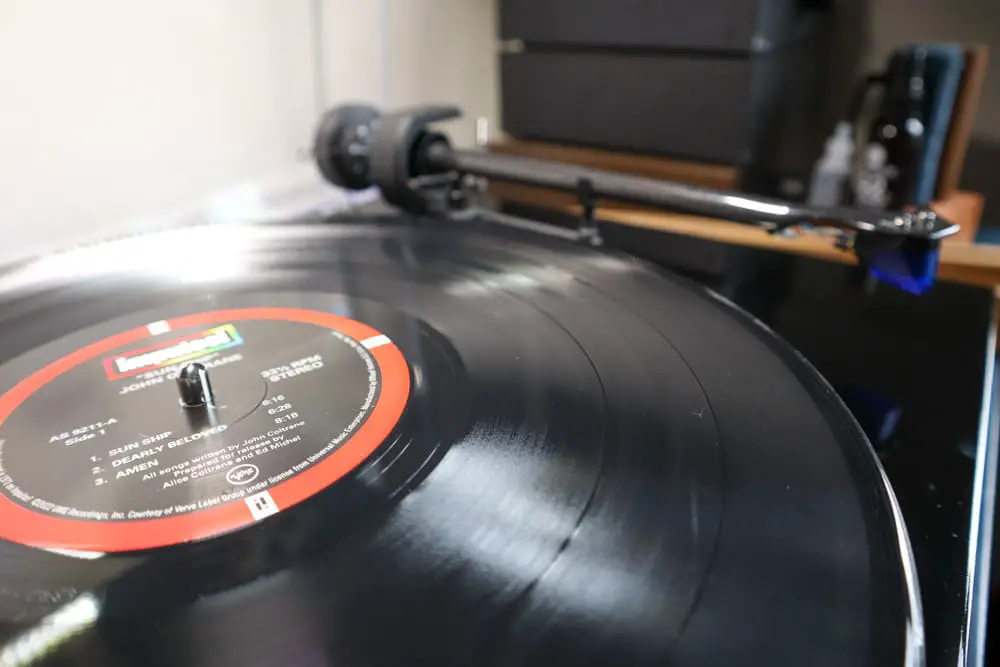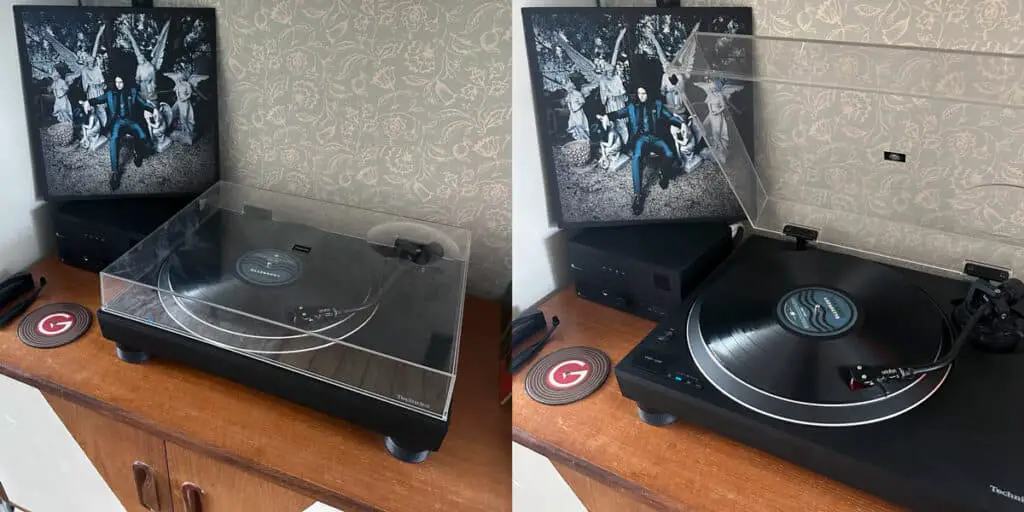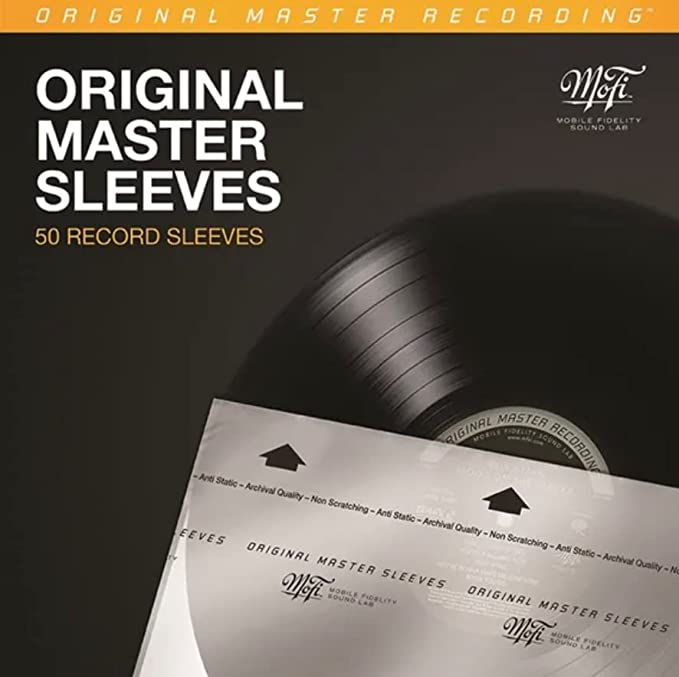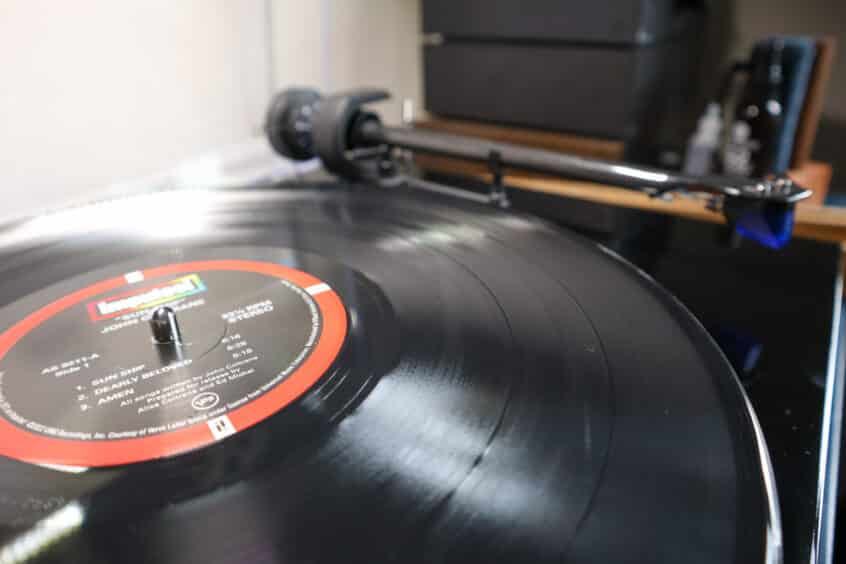When spinning your favorite records of an evening, you might be tempted at the end of the night to simply close the lid (if your turntable has one) rather than return the record to its sleeve.
So can you leave a record on the turntable for an extended period?
Today, I’ll explain why that’s not such a great idea…
OK, so the world isn’t exactly going to come to an end if you occasionally neglect a record on your turntable overnight. However, if you want to preserve your records for the long term and keep them in pristine, clean condition, it’s best to return records to their sleeve as soon as you finish playing them on your record deck.

Is it bad to leave vinyl records on the player?
In short, yes. Leaving a record on your turntable will expose it unnecessarily to airborne dust and increase the risk of warping due to potential exposure to sunlight or other heat sources.
Leaving records on the turntable regularly will quickly introduce pops and clicks to the sound of your records caused by a build-up of dust. This is one of the most common bad habits that damage records.
Dirty records not only sound worse, they also put unnecessary strain on your stylus, speeding up stylus wear. There is also the potential for dirt and dust to eventually become “baked” in the record surface or for it to simply speed up groove wear.
Either way you look at it, you want to keep airborne dust under control.
The best way to minimize dust build-up is to use a carbon fiber record brush before and after you play each side and return the record to a high-quality anti-static inner sleeve immediately after you’re finished.
Should you play records with the dust cover on?
This is a frequently asked and much-debated question.
Dust covers are great for protecting your turntable from dust when it’s not in use, but they can cause a degrading of sound quality if lowered during playback.
The theory is that dust covers are just another resonant surface that can transmit unwanted noise from the speakers back into the stylus, and, ultimately, the audio system.
At very high volumes, this can cause BIG feedback problems. Most high-end turntables do not have a dust cover for this very reason, and you’ll often see DJs remove the cover entirely from their decks to reduce resonant surface areas.
That said, if you’re playing records at moderate or low volumes in a living room where household pets and kids could accidentally damage your records, a dust-cover-down approach may be a wise move! This is the attitude I adopt when playing records outside of my dedicated listening room.

What to do if your records become dirty:
OK, so you’ve left a few records out and you’re worried they’re now dirty and unplayable…
Fear not: we can clean and return those precious records to their former audiophile glory.
There are three main ways to clean records:
- By hand using a microfiber cloth and a good record cleaning fluid
- Using a vacuum record cleaning machine
- Using an ultrasonic record cleaning machine
You can learn more about each method be following my ultimate guide on how to clean vinyl records, here.
The Importance of Record Storage
Clean records, stored correctly and properly handled, will last a lifetime and beyond.
You’ll want to store your records vertically in a good-quality record cabinet or storage crate in a vertical position. Stacking records horizontally will cause them to warp over time.
Good quality inner sleeves are an absolute must to protect the record from dust, scratches, and static. Outer record sleeves are recommended to protect the artwork when pulling each record in and out of storage.

Room conditions and climate are other important factors, but at this point, it’s worth checking out my full guide on record how to store records safely.
The Bottom Line: Can you leave a record on the turntable?
Leaving vinyl records on your turntable is just one of many bad habits collectors often get into that cause avoidable damage over time.
If you do accidentally leave a record out (or you have a lazy moment—I have many… we all do) then you can mitigate the damage by removing the surface dust using a carbon fiber record brush before returning the vinyl to its sleeve.
Ultimately, records exist to be played and enjoyed. Maintaining a record collection in the best possible condition is all part of the enjoyment of music on vinyl.
You’re building a library of music that says something about you. And, perhaps, you might even want to hand said collection down to your children or another family member or friend.
Keeping your records in good overall shape will help maintain their financial and sentimental value.
Can You Leave a Record on the Turntable FAQ:
Have you ever accidentally fallen asleep and left the turntable spinning endlessly in the deadwax? (That’s the looping locked groove at the end of your records).
We’ve all done this from time-to-time.
You’ll want to avoid doing this as it will create unnecessary wear and tear on your turntable and stylus.
If this is a concern for you, Audio Technica makes a safety riser accessory that fits well on most manual turntables to automatically lift the tonearm at the end of each side.
In the case of automatic turntables, this won’t be a problem for you. More on the pros and cons of automatic vs manual turntables, here.
Leaving the needle (stylus) on the record surface while not spinning is best avoided as it increases the risk of accidentally scratching the record surface by knocking the tonearm.



